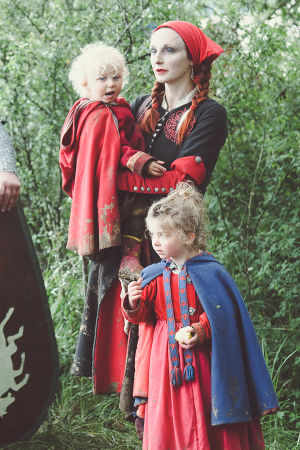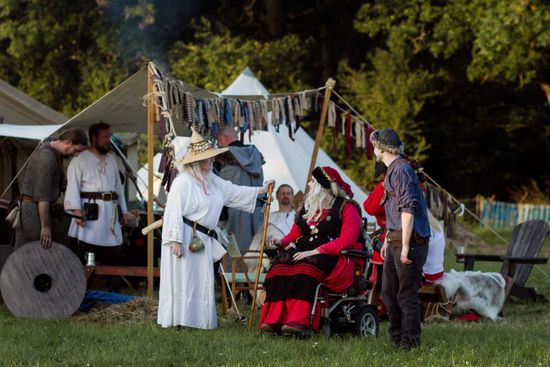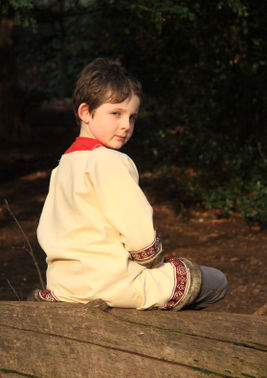Varushka people
Varushka is a hard country. Life here is a struggle; the summers are short and the winters are long. The land is wild and resentful – it resists taming and sends monsters to threaten those who would settle here. Varushkans are stoic and grim in the face of this adversity, only letting down their guard when they are able to secure their door against the dangers of the night.
Stories claim that the draughir lineage began in Varushka in a valley beset by terrible famine. A boyar made a deal with a powerful Winter eternal to save her people but in the process they were transformed into monsters who feasted on rotten meat and the flesh of the dead. Traditionally the Varushkans have a great deal of respect for the pragmatic instincts of the draughir and for their ability to survive, while simultaneously keeping a close eye on them in case their monstrous appetites overwhelm them.
To endure the predations of the land, the Varushkans have become guarded and wary. Most live in vales, wide valleys where the roads in and out can easily be watched. To survive here requires constant protection from the terrible dangers that infest the land. If those who provide that protection sometimes exact a grim toll in return, that too is the Varushkan way. Varushkans have little time for fairy stories where everything ends happily ever after – they are a people well used to making hard choices.
Prospering in Varushka depends on following the iron laws of the land. Those who depart from the road or otherwise break the rules risk bringing ruin to the doors of their family and loved ones. At times those who display the briar lineage have been distrusted, a common prejudice assuming that their wilful nature makes it difficult for them to follow the rules. However the Imperial Synod in Autumn 383YE, the Synod rebuked all citizens telling them it was a failing of Pride to judge a briar for what they are rather than what they do. Varushkans are a proud people and have taken the lesson to heart and no longer permit their neighbours to distrust or suspect briars based on lineage alone.
Isolation is a fact of life here. Dangerous wilderness, where darker powers hold sway, lies between the vales. The Varushka have built roads to join their settlements and learned ways to ward those roads against the fell creatures that stalk the night, but no warding is perfect and some evils cannot be kept out by magic alone. The people know that if they grow weak or soft, if they forget the lessons of their past and the blood that was spilled to learn them, then those dark powers will reach out to claim them.
The malevolent entities that dwell in the dark woods of Varushka come in many different forms. The weaker ones, which the Varushkans call Wolves, can be driven off by strength of arms alone; but the most dangerous, called Sovereigns, require more subtle ways to deal with them. Varushkans have learned to prize wisdom dearly, for understanding is essential to dealing with the threats they face. Sometimes these threats can be defeated and destroyed but more often they must be endured. And sometimes they must be bargained with; for no matter how distasteful, it is a truism that it is better for one life to be lost than all.
The wealth of the land is what makes the dangers of Varushka worth facing. Veins of ore lie close to the surface, the trees provide valuable amber and timber, while the forests and rivers teem with beasts. Danger is never far away, but the land provides commensurate reward for those who are careful and wise enough to endure its predations.
The Varushkan people are often considered pessimistic by outsiders. They expect the worst, and they prepare accordingly. Yet they also possess an irrepressible spirit – they endure hardship but they refuse to give in. They take fierce pride in their ability to prosper in a dangerous land. They carve out homes for their families from the darkest woods, and reap rich rewards for daring to live where lesser folk would falter. No one can know the joy of small things like a Varushkan, for nothing is given them: they have fought for everything they have.
At one point, they were two peoples – the Vard and the Ushka. The necessity of living in a harsh land first blurred and then removed those distinctions centuries ago, and they are absolutely one people. The only exception is those Varushkans who are born with a white birthmark somewhere on their bodies. According to legend, this mark shows the child as having a strong connection to the ancient Ushka, and the shape of the birthmark may give a hint as to who the child may have been in a past life. Children born with such birthmarks are often a little fey and unpredictable, feeling a strong instinctual connection to the dark forests and are said to possess a natural talent for bargains – a “silver tongue flows from a silver mark.”
Names
Varushkan names are primarily Slavic in flavour.
It is common for children to initially be named with something more akin to a nickname, a substitutional name, that it is often thought will not attract the curiosity of those Evils that constantly threaten the Vales. These names are short and often dismissive in tone, to keep the children safe. Normally the child will be granted their proper name sometime between 7 and 11 years old, as they begin to develop towards adulthood. It has been known for these names to last long into adulthood though, mostly much to the bearer's annoyance.
Adult names are normally three part - a first name that carries meaning itself, a second name that is patronymic or matronymic with -ovich, -ovna, -in, -yn, -ov, -ev, --eva, -ova, -ina or similar suffixes added to one of the persons parents' names. The third name that is usually the family name, though sometimes this is derived from the Vale's name especially when unfortunate circumstances have struck the family.
N.B. Whilst real world Slavic names may be given to specific genders, Empire is a gender blind setting and people of any gender choose any name they like that is appropriate to their nation.
Naming resources
Wikipedia has an excellent list of names, along with the historical meanings.
Further Reading
Core Brief
Additional Information


